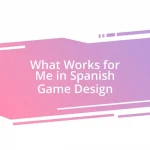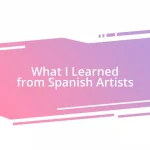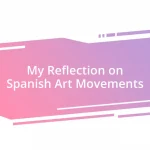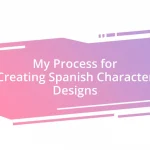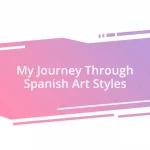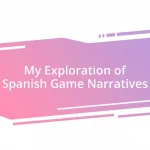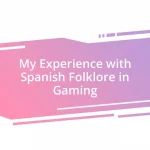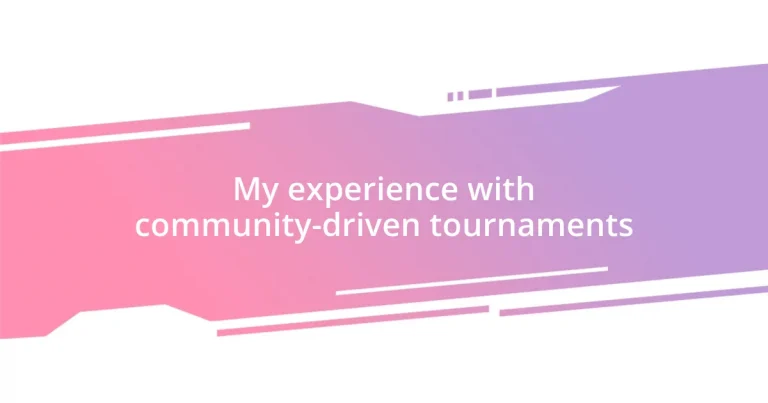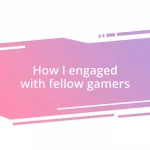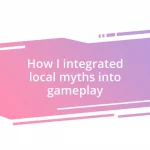Key takeaways:
- Community-driven tournaments foster strong connections and inclusivity, enhancing the overall experience beyond mere competition.
- Choosing the right platform and organizing with a clear vision are crucial for successful tournament execution and participant engagement.
- Valuable feedback and shared experiences post-event can lead to personal growth, community bonding, and continuous improvement for future tournaments.
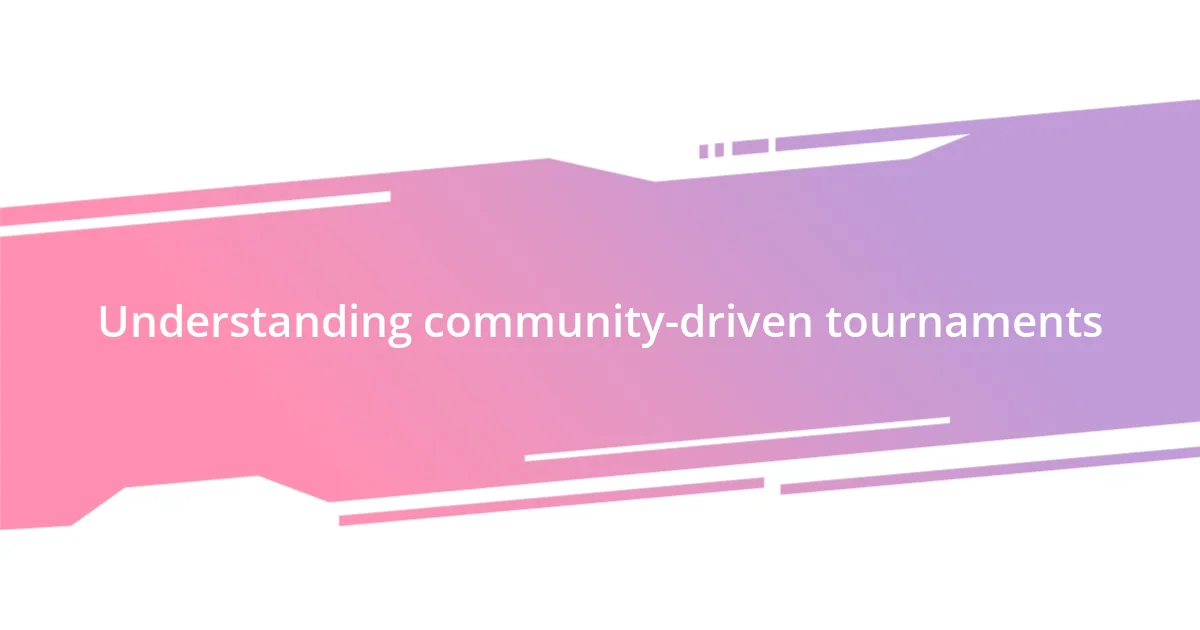
Understanding community-driven tournaments
Community-driven tournaments offer a unique experience that blends competition with camaraderie. I remember participating in a local gaming event where players were not just opponents but friends sharing a common passion. It felt amazing to compete alongside others who were just as invested in the game as I was—have you ever felt that spark of connection during a match?
What really sets these tournaments apart is the sense of ownership communities possess. Organizing events means tapping into the talents and passions of locals, which leads to a diverse range of participants and innovative formats. In my experience, these tournaments often adapt to player feedback, creating an environment where everyone feels heard. Isn’t it empowering to know that your voice can shape the structure of a tournament?
The emotional investment in community-driven tournaments often becomes palpable, making the stakes feel higher. I recall the first time I watched friends rally together to support a teammate—it was exhilarating. It made me wonder, what drives people to gather and compete like this? Ultimately, it’s the shared love for the game that bridges gaps and fosters an inclusive atmosphere, reminding us why we enjoy gaming in the first place.
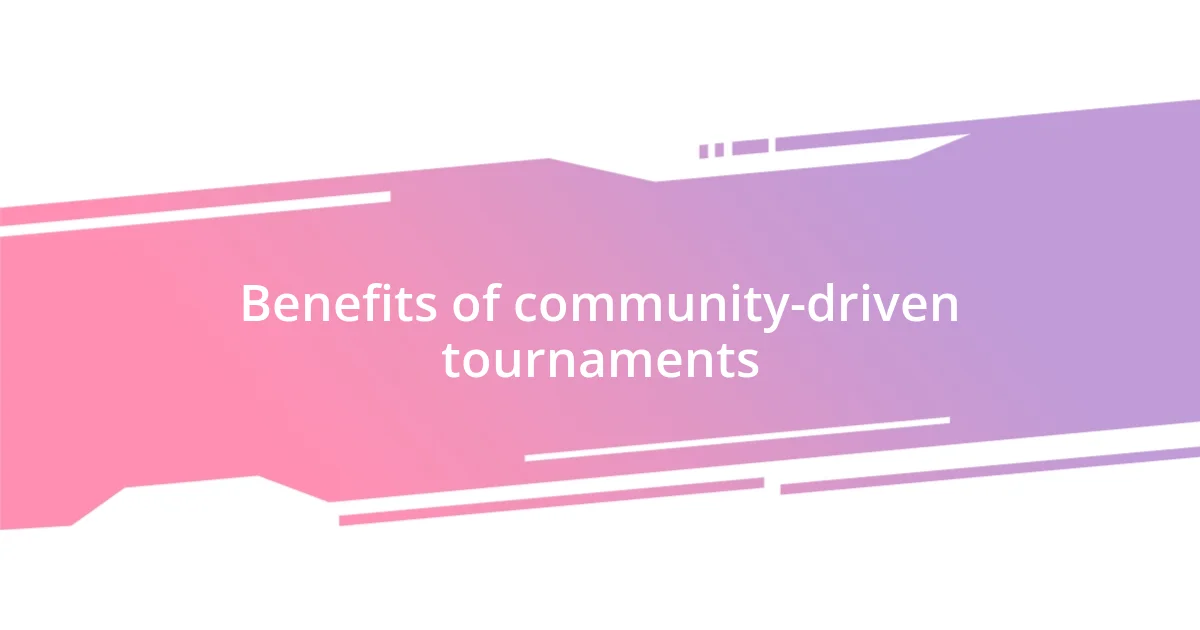
Benefits of community-driven tournaments
When I think about the benefits of community-driven tournaments, the first thing that comes to mind is the powerful sense of belonging they create. It’s like being part of a family where everyone supports one another. I remember one particular tournament where I didn’t know many players beforehand. By the end of it, I had connected with several, sharing not just tactics but laughs and frustrations over gameplay. That feeling of unity is something corporate tournaments often miss; they can be more about the prize than the experience.
Here’s a list of some benefits I’ve observed in community-driven tournaments:
- Stronger Connections: Players forge lasting friendships, creating networks that extend beyond the game.
- Inclusivity: They often welcome a wider range of skill levels, allowing beginners to learn alongside experienced players.
- Adaptability: Events can quickly adjust based on participant feedback, enhancing the overall experience.
- Shared Knowledge: Players often share strategies and tips, elevating everyone’s skill level.
- Local Engagement: These tournaments invigorate the local community, encouraging participation and support from nearby businesses and residents.
Each event I’ve attended has taught me something valuable, whether it was honing my skills or appreciating the effort others put into organizing. There’s a sense of personal growth that extends beyond just winning or losing.
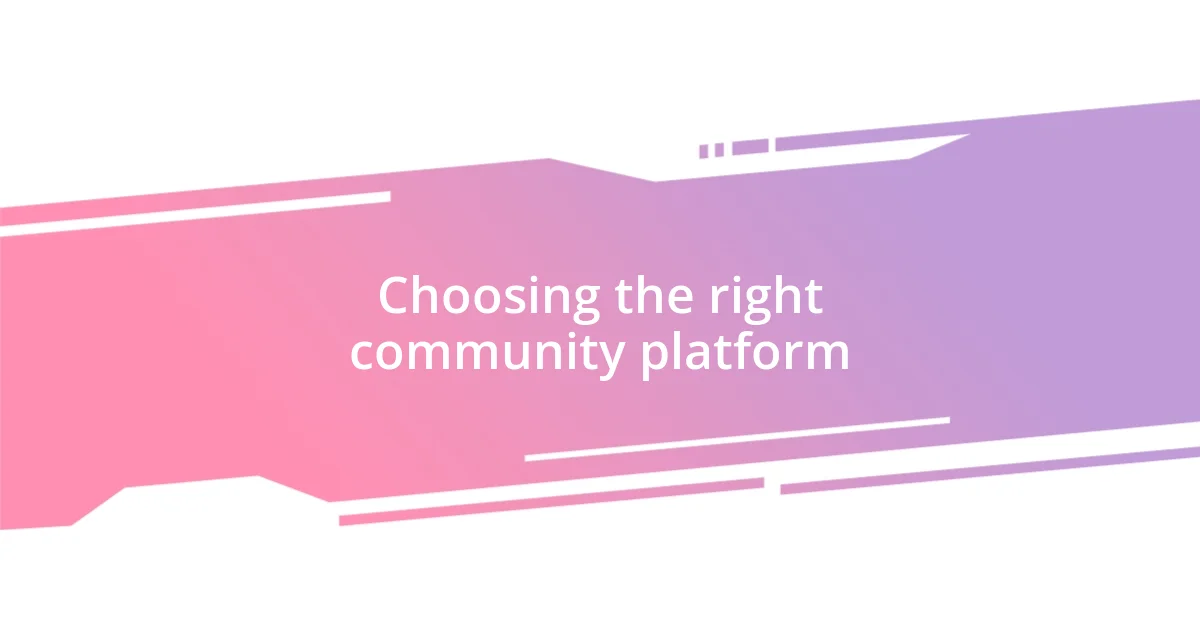
Choosing the right community platform
Choosing the right community platform is crucial for successful tournaments. From my experience, platforms can vary greatly in their capabilities and user engagement features. For instance, I once chose a platform that allowed for live updates and chat features. It made a world of difference in enhancing player interactions and overall excitement during matches.
When evaluating options, consider the specific needs of your community. Do you seek a platform to facilitate connections and discussions? Or do you need one that streamlines registration and score tracking? I vividly remember a tournament I participated in where the platform fell short on communication tools, leading to confusion among participants. The right platform can significantly elevate the experience and reduce misunderstandings, so it’s worth taking the time to find one that aligns with your goals.
Here’s a quick comparison of popular community platforms to help you make an informed decision:
| Platform | Key Features |
|---|---|
| Discord | Real-time communication and community engagement |
| Challonge | Bracket creation and tournament management |
| Battlefy | Customization options and participant tracking |
| Smash.gg | Robust management features for large events |
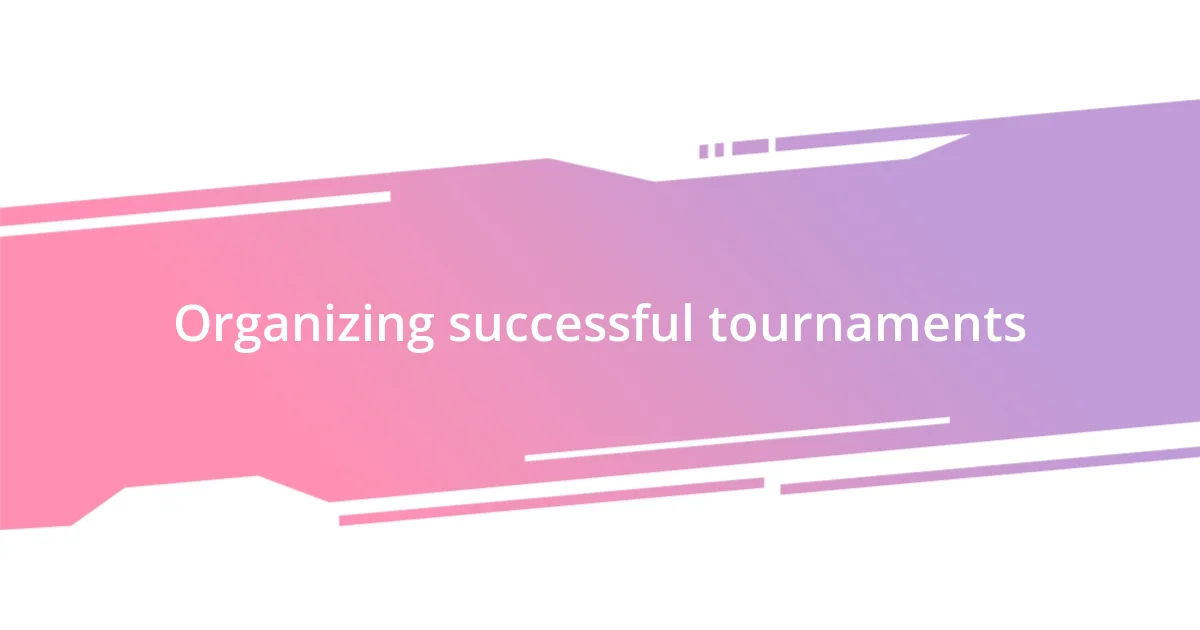
Organizing successful tournaments
Organizing successful tournaments requires a solid plan and a clear vision. I often think back to a tournament I helped organize where we spent hours discussing the format and rules. We wanted everything to be transparent and fair. Each time a participant asked a question, I felt more confident in our approach since we had taken the time to think things through. It reinforced my belief that a well-structured event lays the foundation for an enjoyable experience.
It’s also essential to foster a welcoming atmosphere. One of my most memorable experiences came from a small local tournament where the organizers went out of their way to encourage every participant, regardless of skill level. I remember being cheered on during my first match even though I was clearly a novice. Encouragement like that makes a huge difference, creating an environment where players feel valued and motivated to improve.
Finally, I can’t stress enough the importance of feedback post-tournament. After organizing a recent event, I sent out a quick survey to participants. Their input was eye-opening, revealing aspects of the event I hadn’t considered. This willingness to listen and adjust for future tournaments not only improves the organization but also shows the community that their voices matter. Isn’t it rewarding to see your events evolve based on the people they serve?
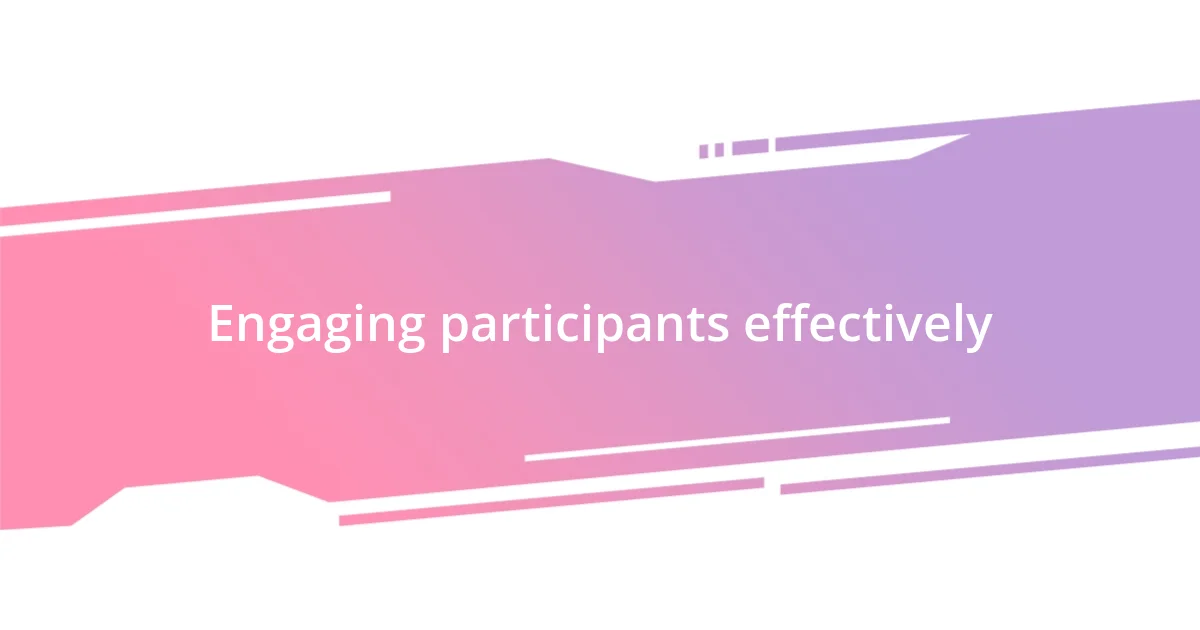
Engaging participants effectively
Engaging participants effectively goes beyond just running an event; it’s about creating an immersive experience. I recall a specific tournament where we initiated a “Meet Your Opponent” session before matches. This small meet-up allowed players to connect, share strategies, and even break the ice. It transformed the competitive atmosphere into one of camaraderie, making everyone feel like part of the same community. Have you ever noticed how a few friendly exchanges can transform the dynamics of a tournament?
Another strategy that proved invaluable was incorporating interactive elements during the event. At one tournament, we introduced live polling for match predictions, which spurred lively discussions among participants. The energy in the air was palpable as players eagerly shared their opinions and rooted for their favorites. It also gave a sense of involvement beyond just gaming; participants felt they had a stake in the outcomes. How do you think little touches like this can enhance the overall enjoyment of an event?
Finally, ongoing communication plays a vital role in keeping participants engaged throughout the tournament. I remember receiving late-game updates via a group chat during a massive event. It kept everyone informed and motivated, even if they weren’t actively playing. Knowing what was happening in real-time created a buzz that amplified the competitive spirit. Isn’t it fascinating how simple tactics in communication can elevate the entire tournament experience?
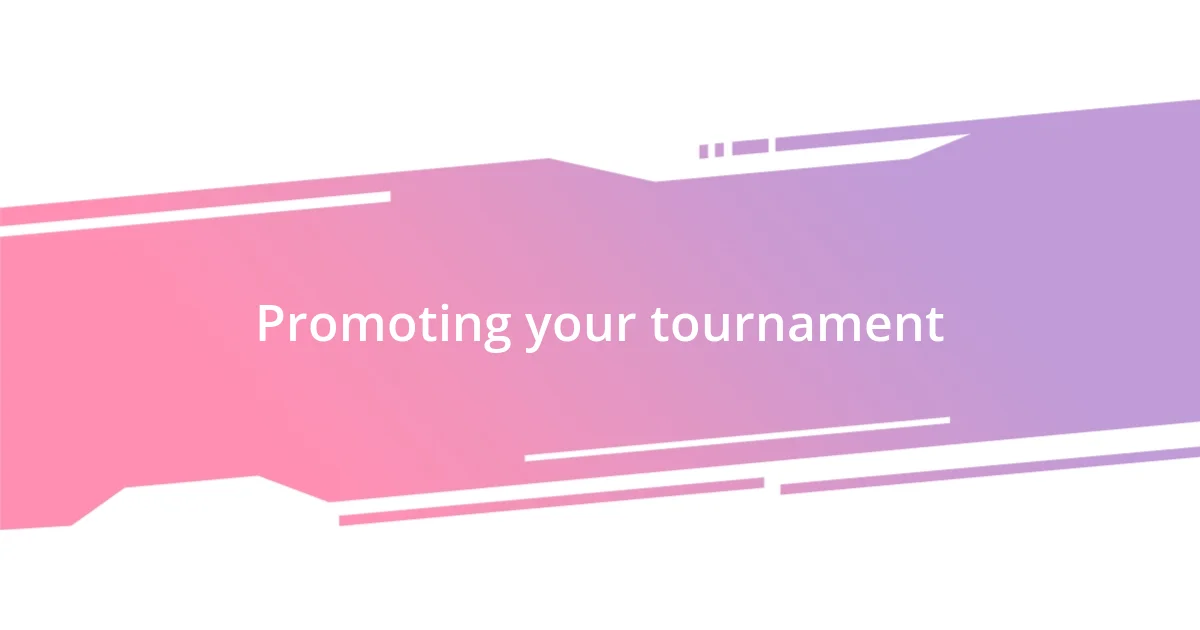
Promoting your tournament
Promoting your tournament is crucial to attract the right participants, and I’ve learned that social media can be a game changer. One time, I created a dedicated event page, sharing behind-the-scenes updates and teasers leading up to the tournament. I remember the excitement that built as more people engaged through likes and shares. It became a vibrant space where participants could connect, fostering a sense of community even before the event started. Have you ever noticed how a little buzz can turn a good turnout into a great one?
In addition to social media, local partnerships can significantly boost visibility. At a recent tournament, we collaborated with a nearby gaming café, which allowed us to feature their logo on our promotional materials. They shared our tournament information on their platforms, and it felt like a win-win for both parties. I can’t express how much it amplified our reach; suddenly, people who might not have known about us were drawn in. Building these partnerships can really transform how your tournament is perceived in the community, don’t you think?
It’s equally important to make the registration process as easy and accessible as possible. I vividly remember a tournament where I struggled with unclear sign-up instructions; it made me reflect on how frustrating that must be for participants. By simplifying the registration form and providing clear guidelines, I saw a noticeable increase in sign-ups. And let’s be honest, a seamless experience right from the start can set the tone for the entire event. How much easier would it be for everyone if organizing and participating in tournaments felt effortless?
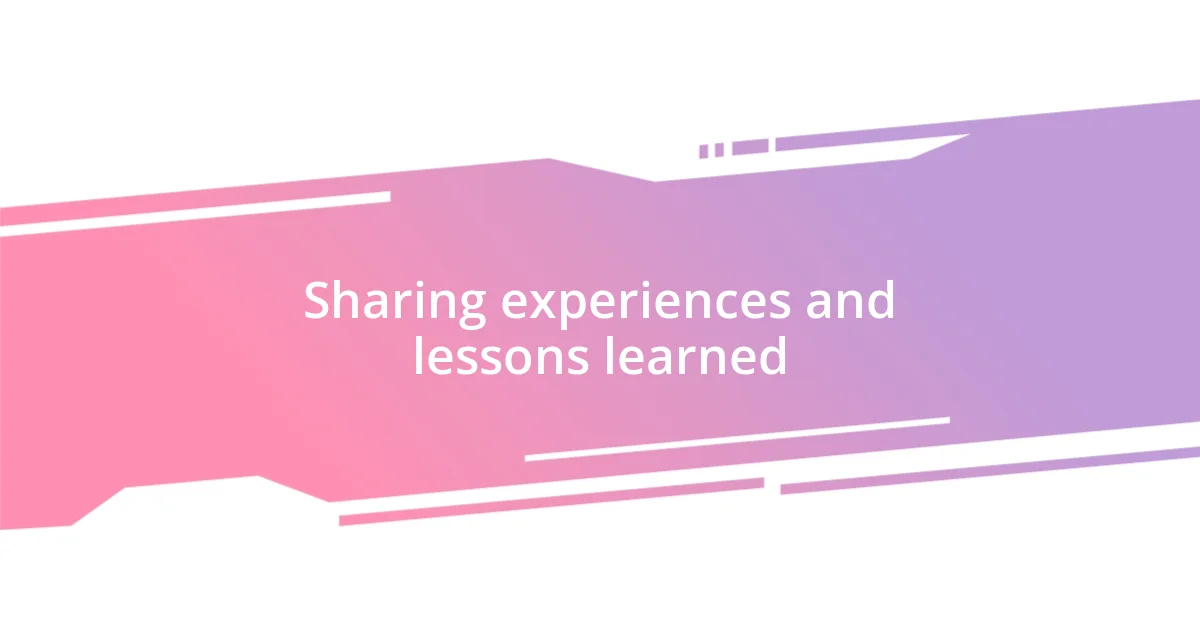
Sharing experiences and lessons learned
Sharing experiences in community-driven tournaments has been enlightening for me. One standout moment was after we wrapped up a particularly intense competition. A player approached me, eyes alight with excitement, and shared how the matches had reignited their passion for gaming. Hearing their story made me realize how tournaments can be more than just competitions; they can be avenues for personal growth and reconnection with one’s interests. Have you ever experienced that flutter of joy when you find something that truly ignites your passion?
I’ve also learned that feedback is a goldmine for improvement. At another tournament, I decided to send out a post-event survey, and the responses were both eye-opening and heartwarming. While some players highlighted areas for improvement, many shared fond memories that brought a smile to my face. A participant mentioned how the unexpected friendships made during the event were as valuable as the gameplay itself. Isn’t it fascinating how a simple question can unveil such deep insights?
Finally, embracing challenges is part of the journey. I recall a technical glitch during a live stream that threatened to derail our event. Instead of panicking, I quickly rallied the participants to engage in some light-hearted banter while we resolved the issue. That moment not only showcased our community’s resilience but also turned a potential disaster into an unforgettable shared experience. How often do you think we underestimate our ability to pivot and create memories from our challenges?
